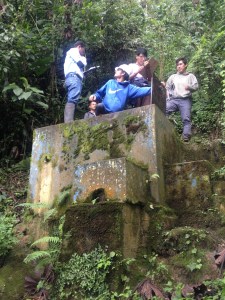My favorite part of my job is definitely when I get to be out in the field (“campo”), inspecting or repairing water systems with the operators or the volunteer water committees… and yet I haven’t written much about that, so today I am taking some time to share some of the work we did last week.
An important part of maintaining a rural water system is cleaning and disinfecting it regularly so that sediments, microorganisms, and mold don’t build up inside. This can be a little complicated because it requires high concentrations of bleach in a confined space, that later have to be disposed of in a safe site (not a river or stream). So, you can see why training water system operators to properly clean the water system is an important job.

You may recall that we had a hands-on workshop with the system operators back in April, where we went to a water system and actually practiced the disinfection process. But since every system is a little different, and it takes a few times to change old habits, we are now doing one-on-one trainings with five different communities. Since we are working with a group of university students studying environmental engineering, we invited them to come learn and help with one of the systems.

It is quite a coordination process working with volunteer water committees because we have work within their schedules. That means we wait for the water committee to schedule their next meeting, we attend the meeting, we find out when they plan to do their next cleaning, and we ask if we can come oversee the process and help out. For me, that means a 30-minute bike ride (each way) through the beautiful green hills of Oxapampa to arrive at the community each time we need to coordinate, attend meetings, or and participate in activities. (Poor me!)
All the coordination paid off this week, and we had a great hands-on training, resulting in an improved process for cleaning and disinfection that will make it quicker for the operator and will protect the nearby river.

Another day during the week, 30 minutes on bicycle in the opposite direction, we did a water system inspection with the group of university students. After hiking up through one of the beautiful verdant hills for more than an hour, we arrived at the spring box where the water system collects water from a spring. We took measurements and discussed what was working well and what could be improved, and then descended, doing the same for each component of the water system.

Later in the week, we returned to the same system to train the university students in monitoring chlorine levels. We explained the key monitoring points in the distribution system, and we then went to each point to take measurements, (me in bicycle and them on their motorcycle.) Their homework was then to monitor the chlorine for a week, create a registry for the results, and to then train the operator to use the registry.

That same day, the operator had identified a leak in the system, so we took the opportunity to help him fix the leak, learn his procedure, and point out a few additional best practices for the future. The operators tend to be elected by the community, and often don’t have any water-system-specific training, but because they have often built their houses or worked on similar projects, they have a general idea and incredible ingenuity and can complete the basic functions, even if they aren’t aware of the best practices.


The field work is really my favorite part of the job, so I’m really happy to be in the field-work phase of our project – that means more time working side-by-side with water committees and operators, so they can be more effective at ensuring their communities have clean water.
